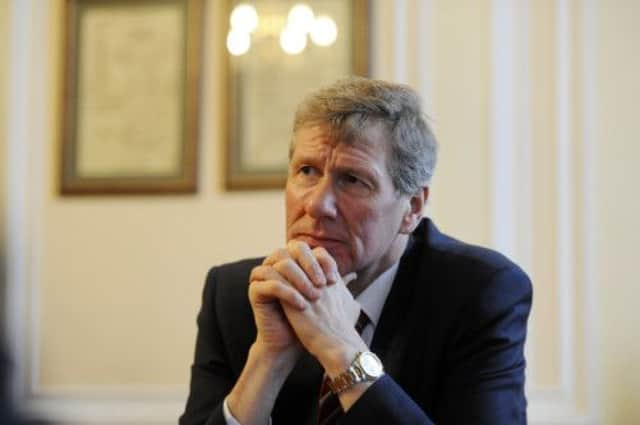GCHQ fears: Call for assurances over spying on Scots


MacAskill has written to the UK government stating that intelligence gathering should not be abused following more reports that GCHQ has been harvesting sensitive personal details which it is sharing with its American counterpart, the National Security Agency (NSA).
In a letter to Foreign Secretary William Hague, MacAskill says that intelligence gathering must be subject to democratic scrutiny.
Advertisement
Hide AdAdvertisement
Hide AdThe letter was sent following suggestions that GCHQ (Government Communications HQ) has secretly gained access to the network of cables which carry the world’s phone calls and internet traffic.
According to reports in the Guardian newspaper, GCHQ is able to tap into and store internet and communications data from cables for up to 30 days so it can be analysed under an operation codenamed Tempora, which has been running for 18 months. The Cheltenham-based agency said it would not comment on intelligence matters but insisted it was “scrupulous” in complying with the law.
It was reported that there were two principal components to the agency’s surveillance programme, called Mastering the Internet and Global Telecoms Exploitation.
The latest disclosures about the UK’s intelligence services came from another leak from Edward Snowden, the former NSA contractor responsible for a string of revelations about US spying activities. Yesterday it emerged that Snowden has been charged by the US authorities in connection with the leak of information.
BT, which is one of the country’s main fibre-optic network providers, said it could not comment on national security issues.
As a result of the Tempora operation, it was claimed that GCHQ and the NSA are able to process vast quantities of communications between innocent people as well as those suspected of being involved in sinister activity. The sort of information that could be accessed includes phone calls, e-mails, Facebook entries and internet histories.
Mounting concern over the activities of the UK’s spy agency and the NSA led to MacAskill writing to Hague to emphasise that concerns that data may have been taken from people in Scotland should be considered by the UK parliament’s Intelligence and Security Committee (ISC).
A Scottish Government spokesman said yesterday: “The Justice Secretary has written to William Hague to seek assurances that UK legislation is fully upheld in cases of interception undertaken by, or on behalf of, GCHQ in Scotland. While recognising that there is a legitimate need for the intelligence services to examine data, this should not be open to abuse and decisions must be subject to democratic scrutiny.
Advertisement
Hide AdAdvertisement
Hide Ad“Mr MacAskill has stressed that the concerns of people in Scotland must be fully taken into account by the Intelligence and Security Committee in considering the report from GCHQ, and their future actions.”
Sir Malcolm Rifkind, the chairman of the ISC, said he expected to receive a report from GCHQ in the coming days on its response to the allegations.
“Whenever there are allegations about the intelligence agencies, we seek to find out the full facts. We have the power to go into all the highly classified material. We don’t have to accept what they say, we can go further into the raw data,” he told the BBC’s Today programme.
The Guardian reported that GCHQ lawyers told US counterparts there was a “light oversight regime” in Britain compared with America.
The newspaper said the documents revealed that, by last year, GCHQ was handling 600 million “telephone events” each day, had tapped more than 200 fibre-optic cables and was able to process data from at least 46 of them at a time.
Privacy campaign group Big Brother Watch’s director Nick Pickles said: “This appears to be dangerously close to, if not exactly, the centralised database of all our internet communications, including some content, that successive governments have ruled out and parliament has never legislated for.
“Britain has a clear legal process in place to govern the interception of the content of communications, and blanket interception is not a part of that system.
“If GCHQ has been intercepting huge numbers of innocent people’s communications as part of a massive sweeping exercise then I struggle to see how that squares with a process that requires a warrant for each individual intercept. This question must be urgently addressed in parliament.”
Advertisement
Hide AdAdvertisement
Hide AdA GCHQ spokeswoman said: “We do not comment on intelligence matters. Our intelligence agencies continue to adhere to a rigorous legal compliance regime. GCHQ are scrupulous in their legal compliance.”
The intelligence gathered is understood to have contributed to a number of arrests and convictions, including a terror cell in the Midlands who were jailed for planning co-ordinated attacks.
It is also claimed to have led to the arrest of five Luton-based individuals preparing acts of terror, and three London-based people planning attacks prior to the Olympics.
A source with knowledge of the work of the intelligence agencies said: “It’s not about going through everybody’s e-mails or phone calls. It’s about homing in on criminal activity in order to lead the intelligence agencies to be able to take action.”
The source said the vast majority of the data gathered was discarded, with the agency focused on the “needles” of relevant information within the “haystack” of material.
SEE ALSO: